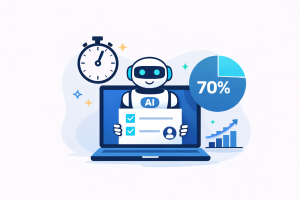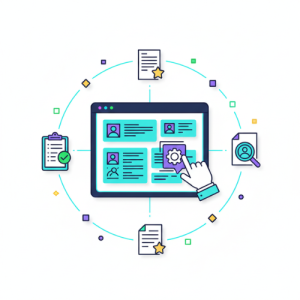– Article by Diddo van Zand and Roderick Bronzwaer
Recruitment has always been a human-centric profession: recruiters engage with candidates, discover their motivations and make connections. However, in this era of rapid technological advancement and artificial intelligence (AI), the rules of the game have changed. What does this mean for the future of recruitment? More importantly, how can recruiters anticipate and adapt?
Human Contact Remains Essential
While technology plays a significant role in changing the recruitment process, human contact won’t change and will not disappear. Candidates still need human interaction. They are not just looking for a job; they are looking for a place where they feel at home, a team where they can collaborate and grow with. This human need cannot simply be replaced by machines, not even by the most advanced AI.
However, the role of the recruiter is evolving. In the past, a lot of time was spent on administrative tasks and note taking, an interview process that can now be automated. But this doesn’t mean that AI makes recruiters redundant. On the contrary, recruiters now have more time and room to focus on what really matters: connecting with candidates while seeking the best cultural match.
AI as a Supporting Partner
AI can be incredibly valuable in supporting recruiters. It can quickly analyse large amounts of data, identify patterns that are imperceptible to humans, and even make predictions about candidates’ future performance. All of this allows recruiters to make better-informed decisions and spend less time on repetitive tasks.
A good example of this is the use of AI in assessments. Previously, multiple tests and interviews were needed to select the right candidate, but now AI can analyse conversations and responses within minutes. This results in a more efficient process and better matches. However, AI should always play a supporting role, not a replacing one. Human intuition and experience remain essential for making the final choice.
The Challenge of Exponential Growth
Another important aspect of the future of recruitment is managing exponential growth. This includes population growth, the pace of technological development, and the increasing computational power of computers. Recruiters will face a rapidly changing job market in the future, requiring them to be flexible and adaptive.
How do you stay relevant as a recruiter in such a fast-paced world? The answer lies in adaptability: the ability to embrace new technologies and integrate them into your workflow will become crucial. Recruiters, who can and are willing to do so, will stand out in a competitive market.
Data, Technology, and Transparency
Another aspect recruiters should consider is the increasing transparency that technology offers. For example, AI can uncover biases in the selection process: something humans often struggle with. AI tools can help make recruitment and selection more objective when used correctly.
Recruiters are therefore going to play a significant role. As such, they need to understand (without becoming engineers) how the technology works and what impact it has on their work. As with all technology, the principle of “garbage in, garbage out” applies; if the input is wrong, the outcome will also be incorrect.
Conclusion: Recruitment Remains a Human-Centric Job
Despite all the technological developments, recruitment at its core remains a human job. AI and technology can help streamline processes, make them more objective and lead to faster matches. But it’s the human connection — the ability to truly connect with candidates and understand their needs — that makes the difference.
“The future of recruitment lies in the synergy between humans and technology. Recruiters who can adapt, embrace technology and continue to nurture the human aspect of the job will be the winners of tomorrow.”









